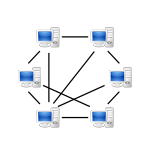 Image via Wikipedia
Image via Wikipedia
My answer to that question is BioTorrents!
This has been a side project that I have been working on lately and considering this is the first international Open Access Week I thought I should finally announce it.
BioTorrents is a website that allows open access sharing of scientific data. It uses the popular BitTorrent peer-to-peer file sharing technology to allow rapid file transferring.
So what is the advantage of using BioTorrents?
- Faster file transfer
- Have you tried to download the entire RefSeq or GEO datasets from NCBI recently? How about all the metagenomic data from CAMERA? Datasets continue to increase in size and downloading speed can be improved by allowing multiple computers/institutions to share their bandwidth.
- More reliable file transfer
- BitTorrent technology has file checking built-in, so that you don't have to worry about corrupt downloads.
- Decentralization of the data ensures that if one server is disabled, that the data is still available from another user.
- A central repository for software and datasets
- Rapid and open sharing of scientific findings continues to push for changes in traditional publication methods and has resulted in an increase in the use of pre-print archives, blogs, etc. However, sharing just datasets and software without a manuscript as an index is not as easy. BioTorrents allows anyone to share their data without a restriction on size (since the files are not actually hosted or transferred by BioTorrents).
- Titles and descriptions of all data on BioTorrents can be browsed by category or searched for keywords (tag cloud coming soon).
- As long as there is at least one user sharing the data it will always be available on BioTorrents. Those pieces of software or datasets that are not popular and not hosted by a user will quietly die (removed from Biotorrents after 2 weeks).
![Reblog this post [with Zemanta]](http://img.zemanta.com/reblog_e.png?x-id=33e63c18-b484-47d6-ba70-70a6a6c42600)
![Reblog this post [with Zemanta]](http://img.zemanta.com/reblog_e.png?x-id=b7a85580-bcc0-4390-8e01-8fa952a5ae9c)